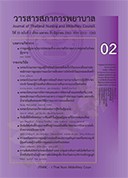Caregivers’ Stress and Coping with Stress from Caring for Terminally Ill Patients in a Palliative Care Unit
Keywords:
caregivers of terminally ill patients, palliative care unit, stress, stress copingAbstract
Abstract:
Objectives: To study caregivers’ levels of stress and their means of coping with stress from caring for terminally ill patients admitted to a palliative care unit.
Design: Descriptive research.
Methodology: Seventy-three family caregivers of terminally ill patients admitted to a palliative care unit of a tertiary hospital in Thailand were recruited through purposive sampling from July to November 2018. The research instruments were: 1) a demographic questionnaire; 2) a stress-measuring scale for caregivers of terminally ill patients; and 3) the Jalowiec Coping Scale (JCS). Data were collected by the researcher and analysed using descriptive statistics, including mean, percentage, and standard deviation.
Results: The family caregivers displayed a moderate average level of stress. A categoryspecifc analysis identifed the physical conditions of the terminal ill patients as the most influential cause of the caregivers’ stress, followed by the caregivers’ psychological, economic, social, and environmental conditions, respectively. To cope with stress, the caregivers used both problem focus coping and emotional focus coping. with greater emphasis on the latter.
Recommendations: The study fndings could be used as baseline data for nursing care planning to assess family caregivers’ stress and to promote their use of appropriate problem focus coping and emotional focus coping.
Downloads
References
Ministry of public health. Public health statistics. Causes of deaths: number and mortality rates per
,000 populations of frst 10 leading cause groups of death 10th revision; 2017, p. 78-80. (in Thai)
Meecharoen W. Family caregivers of cancer patients: roles’ adaptation and quality of life promotion.
Ramathibodi Nursing Journal 2014;20(1):10-22.(in Thai)
Payne A. Caring for the carers. In: Baldwin MA, Woodhouse J, editors: Key concepts in palliative
care. Thousand Oaks, CA, Sage Publications; 2011. p.17-21.
World Health Organization. WHO defnition of palliative care [Internet]; 2017 [cited 2017 January 20]. Available from: https://www.who.int/cancer/palliative/defnition/en/
Pokpalagon P. Palliative care model in Thailand. Nursing Journal of the Ministry of Public Health 2016;26(3): 51. (in Thai)
Srikamnerd S, Namjantra R, Natheesombat K. Care for terminal-stage cancer patients in community.
Journal of The Royal Thai Army Nurses 2009;10(1):59-67. (in Thai)
Kanchanachari O, Sirapongam Y, Monkong S. Roles and needs of caregivers for patients with end of life
in a specifc setting for palliative care. Ramathibodi Nursing Journal 2017; 23(3):328-43.(in Thai)
Sirapo-ngam Y. Family caregiver’s life for Chronic illness patients. Academic conference: Caring for
the family caregiver of chronic patients. Bangkok: Ramathibodi School of Nursing, Faculty of Medicine Ramathibodi Hospital, Mahidol University; 2012, p.16-20. (in Thai)
Kasemkitwattana S, Prison P. Chronic patients’ family caregivers: a risk group that must not be overlooked. Journal of Thailand Nursing and MidWifery Council 2014;29(4):22-31. (in Thai)
Lazarus RS, Folkman S, Dunkel-Schetter C, DeLongis A, Gruen RJ. Dynamics of a stressful
encounter: cognitive appraisal, coping, and encounter outcomes. J Pers Soc Psychol 1986;50(5):992.
Dom WB, Butler L, Coulter L. The relationship between meaning of illness social support coping
strategies and quality of life for lung cancer patients and their family members. Cancer Nurs 2005;29
(2):111-9.
Perez OF, Frias OA, Romero RY, Casado PR. Coping strategies and anxiety in caregivers of palliative
cancer patients. Eur J Cancer Care 2016;25(4):600-7.
Srihaklang P, Sasat S. The effect of care giving skill development and caregiver support group program
on stress in care givers of older persons with terminal stage cancer. Journal of the Police Nurses 2016;
(1): 1-10. (in Thai)
Waeta S, Nilmanut K, Songwathana P. Caregivers’ experiences in providing care for Muslim’ patients
with terminal AIDS. Journal of Thailand Nursing and Midwifery Council 2009; 24(4):95-109. (in Thai)
Yamane T. Statistics: an introductory analysis : 3rded. New York: Harper and Row Publication;1973.
Navacheun S. Factors relating to coping patterns of caregivers of metastasis cancer patients. Faculty of
Medicine, Ramathibodi Hospital, Mahidol University; 2004. (in Thai)
Isaacs B, Kennie AT. The set test as an aid to the detection of dementia in old people. Br J Psychiatric
;123(575):467-70.
Department of Mental Health. The stress test (ST20) 2014 [cite2018 January 9]. Available from: https://www.thai-ergonomic-assessment.blogspot.com/2014/06/st-20.html (in Thai)
Viangpithak N. Stress and coping strategies among patients and patients and relatives in critical care unit
[thesis]. Khonkaen University: 2003. (in Thai)
Best JW. Research in education:3rded. Englewood cliffs, New Jersey: Prentice-Hall; 1977.
Jalowiec A. Confrmatory factor analysis of the Jalowiec Coping scale. In: Walz F, Strickland OL,
editors. Measurement of nursing outcome: Vol 1 Measuring client outcomes New York: Springer;1988. p. 287-308.
Sriprasong S, Hanucharurnkul S, Panpukdee O, Krittayaphong R, Pongthavornkamol K, Vorapongsathorn T. Personal factors related to perceived readiness for hospital discharge of patients with acute myocardial infarction. Journal of Thailand Nursing and Midwifery Council 2009;13(4):268-84.
(in Thai)
Wisaso W. The meaning of being family-cargivers of cancer patients and the life-change in taking on
the role of caregivers. Burapha University; 2002.(in Thai)
Gallagher R, Krawczyk M. Family members’ perceptions of end-of-life care across diverse locations of care. BMC Palliative Care 2013;12(1):12-25.
Mc Adam JL, Dracup KA, White DB, Fontaine DK, Puntillo KA. Symptom experiences by family members
of patients in intensive care units. Am J Crit Care 2010;38(4): 1078-85.
Sawasdeenarunat V, Taneerat A, Wisettharn T. The development of palliative care model for terminal
cancer patients at Maharaj Nakhon Si Thammarat Hospital. Nursing Journal of the Ministry of Public Health 2015;25(1):144-56. (in Thai)
Mangan PA, Taylor KL, Yabroff KR, Fleming DA, Ingham JM. Caregiving near the end of life: unmet
needs and potential solutions. Palliate Sup Care 2003;1(3):247-59.
Sherwood PR, Given BA, Given CW, Schiffman RF, Murman DL, Lovely M, et al. Predictors of
distress in caregivers of persons with a primary malignant brain tumor. Res Nurs Health 2006; 29:105–20.








